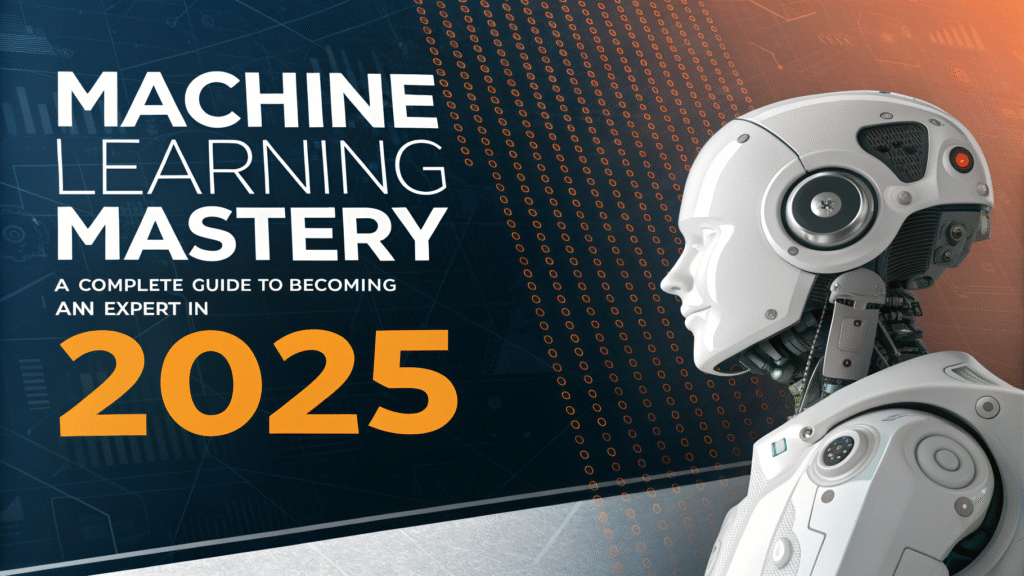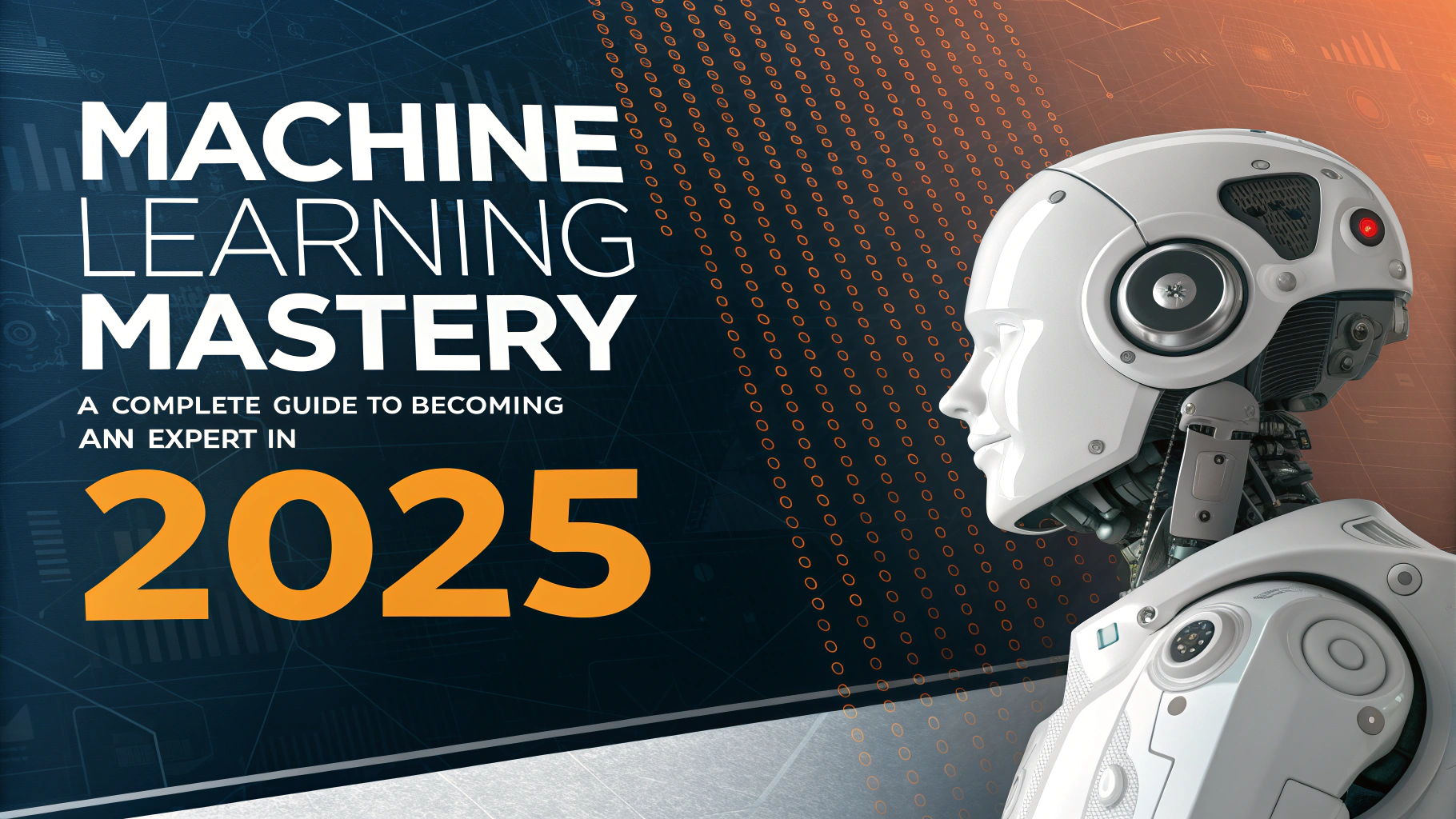Machine Learning (ML) is no longer a futuristic concept — it’s the backbone of modern technology. From chatbots like ChatGPT to recommendation engines on Netflix and Amazon, ML powers nearly every aspect of our digital lives. As industries continue to adopt AI solutions, the demand for machine learning mastery has never been higher.
In this guide, we’ll break down everything you need to know about mastering machine learning in 2025 — from the basics to advanced techniques, tools, career paths, and future trends.

What is Machine Learning?
Machine Learning is a branch of Artificial Intelligence (AI) that allows systems to learn from data without being explicitly programmed. Instead of hard-coding rules, ML models analyze data, find patterns, and make predictions.
Everyday Examples of Machine Learning:
- Spam Filters: Gmail detecting unwanted emails.
- Recommendation Engines: Netflix suggesting your next movie.
- Healthcare: AI detecting early signs of cancer from scans.
- Finance: Fraud detection in online banking.
- Trading: AI bots making split-second stock and crypto trades.
Why Master Machine Learning in 2025?
- High-Demand Career: Machine learning engineers are among the top-paid tech professionals globally.
- Industry Growth: By 2030, AI/ML is expected to contribute $15.7 trillion to the global economy.
- Versatility: ML applies to nearly every field — healthcare, finance, robotics, education, cybersecurity, and entertainment.
- Innovation Hub: Startups and enterprises are racing to develop AI-powered apps, trading bots, medical tools, and automation platforms.
If you master ML, you’re not just learning a skill — you’re preparing for the future of technology.
Core Concepts You Must Master
To become a machine learning expert, you need strong foundations:
1. Types of Machine Learning
- Supervised Learning: Models learn from labeled data (e.g., predicting house prices).
- Unsupervised Learning: Models find hidden patterns (e.g., customer segmentation).
- Reinforcement Learning: Models learn by trial and error (e.g., AI playing chess).
- Semi-Supervised Learning: A hybrid of supervised + unsupervised.
2. Mathematics for Machine Learning
Strong mathematical foundations are crucial:
- Linear Algebra: Vectors, matrices (used in neural networks).
- Calculus: Optimization and gradients.
- Probability & Statistics: Data distributions, hypothesis testing.
3. Key Algorithms to Learn
- Linear Regression & Logistic Regression
- Decision Trees & Random Forests
- Support Vector Machines (SVMs)
- K-Nearest Neighbors (KNN)
- K-Means Clustering
- Neural Networks & Deep Learning Models
4. Popular ML Tools & Libraries
- Python (main programming language)
- Scikit-Learn (basic ML models)
- TensorFlow & PyTorch (deep learning frameworks)
- Keras (simplified neural networks)
- XGBoost & LightGBM (advanced boosting models)
Step-by-Step Roadmap to Machine Learning Mastery
Here’s a learning path for beginners to advanced learners:
Step 1: Learn Python Programming
Python is the language of AI and ML. Start with:
- Data structures (lists, dictionaries, sets)
- Libraries: Numpy, Pandas, Matplotlib
Step 2: Build a Strong Math Foundation
Focus on:
- Linear algebra
- Probability
- Calculus basics
Step 3: Master ML Algorithms
Understand how algorithms work, implement them manually, and then use libraries.
Step 4: Work on Real Datasets
Use datasets from Kaggle, UCI ML Repository, or Google Dataset Search.
Step 5: Learn Deep Learning
Explore:
- Neural Networks
- Convolutional Neural Networks (CNNs)
- Recurrent Neural Networks (RNNs, LSTMs)
- Transformers
Step 6: Specialize in a Domain
Choose a niche:
- Computer Vision (image recognition, facial detection)
- Natural Language Processing (NLP) (chatbots, translation)
- Reinforcement Learning (autonomous agents, gaming AI)
- Financial AI (trading bots, fraud detection)
Step 7: Build Projects & Portfolios
Practical projects:
- Spam Email Classifier
- Stock Price Prediction Bot
- AI Image Generator
- Chatbot with NLP
- Recommender System
Career Opportunities After Mastery
Machine Learning expertise opens doors to multiple careers:
- Machine Learning Engineer
- Data Scientist
- AI Research Scientist
- NLP Engineer
- Computer Vision Engineer
- AI Product Manager
Average salaries (2025 projections):
- Entry-Level ML Engineer: $90,000 – $120,000/year
- Senior ML Engineer: $140,000 – $200,000/year
Challenges in Mastering ML
While exciting, ML mastery isn’t easy:
❌ Steep Learning Curve: Requires programming + math.
❌ Computational Power: Deep learning needs GPUs/TPUs.
❌ Data Dependency: ML models are only as good as the data.
❌ Ethical Concerns: Bias and misuse of AI are real challenges.
Future of Machine Learning in 2025 and Beyond
- AI + Quantum Computing: Faster model training.
- AutoML: Automated ML pipelines, reducing manual coding.
- Edge AI: Running ML models on devices (IoT, smartphones).
- AI in Healthcare: Precision medicine and faster drug discovery.
- Explainable AI (XAI): Making ML decisions more transparent.
Machine learning will continue to reshape industries, jobs, and human interaction with technology.


